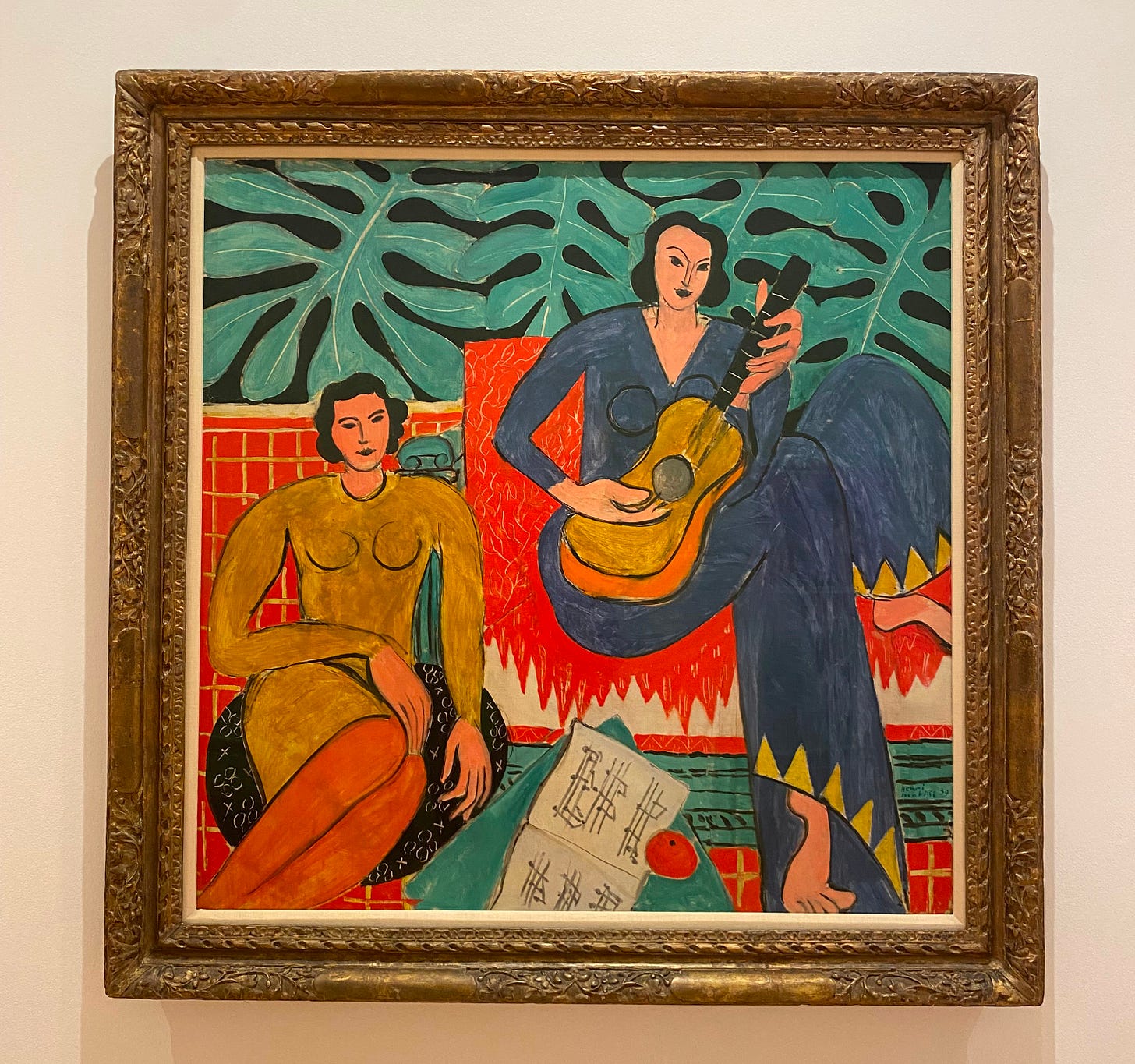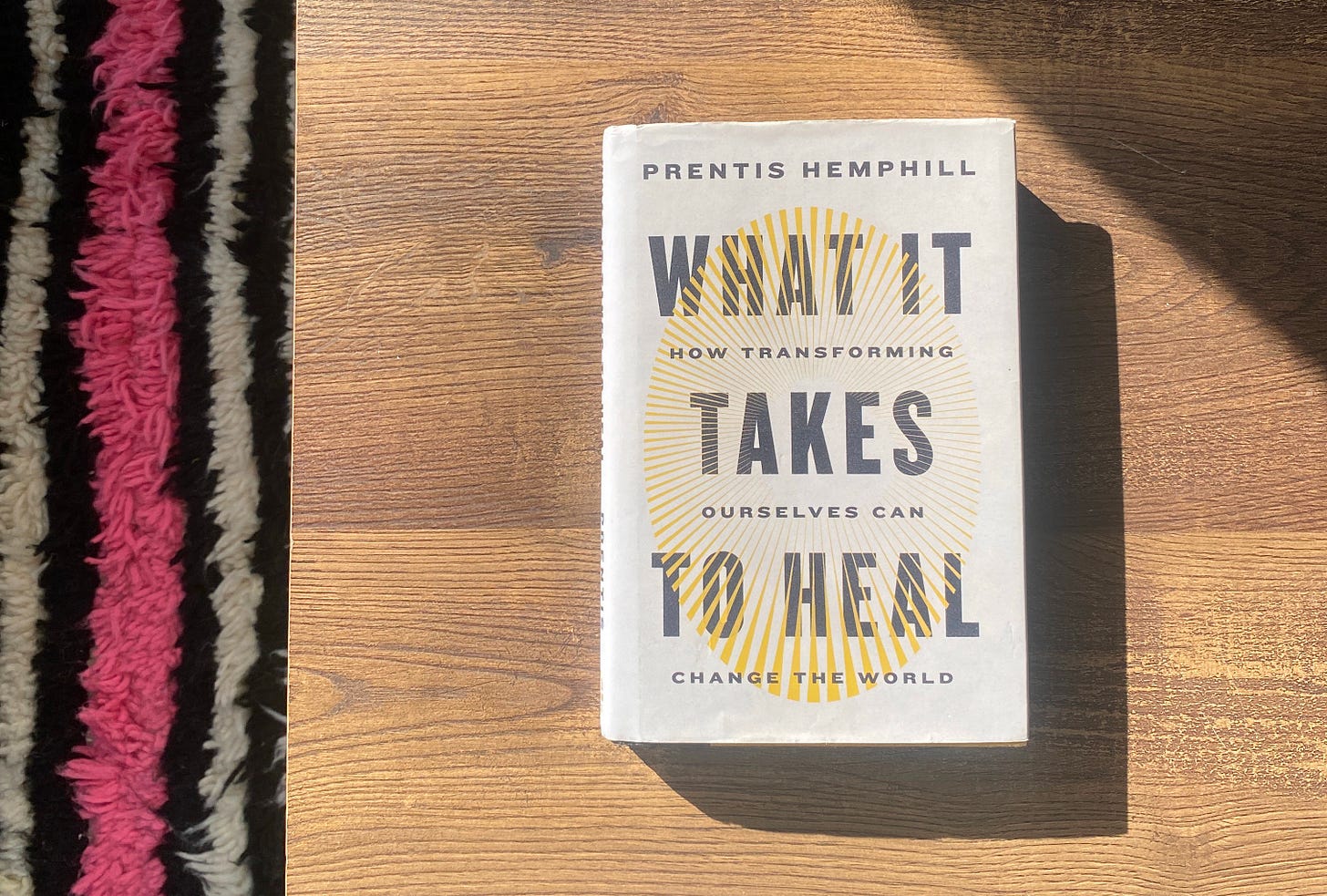“Tell me about your Substack!” she says as we sit together by the bay windows at her new apartment in the city.
What I said
“Oh, I don’t know. It’s been a fun creative project so far. I want to use these 8 months to figure out what I really like to do, and so far that has been a lot of reading and writing.”
What I mean
To me, writing is art, and I have come to rely on art the way I do my contact lenses: to help me see clearly in the world. Last year I began engaging with art more consistently and intentionally than ever before. I found myself projecting and processing my own experiences through what I saw. In paintings, color was laid thickly into textures, reminding me what I thought existed in two dimensions actually exists in three. In dancers I saw movements seamlessly flow between tension and triumph, torment and tenderness, reminding me it is okay, or even beautiful, to oscillate. In songs I heard hope in the tune of notes alone—and that’s coming from a girl who prefers listening with lyrics in hand—reminding me that even in the absence of words, you can still get a message across. And don’t even get me started on literature.
I realized I don’t just want to consume—I want to create. I think I, too, could create a pair of contact lenses through which others could see the world. I’m trying to figure out what that might be, now that I am unbound.
What I said
“Then, one day I wrote something I felt proud of, and I created a Substack to share it.”
What I mean
I have practiced sharing my writing for months. First, I dipped my toes—a poem in class, a paragraph from an essay at lunch. It was exhilarating. I stepped forward—a page or two aloud in the car, a full journal entry on the couch. I let myself hear what people were trying to tell me: that my lived experience was enough, that the structure made sense, that the words mean something to someone sometimes. Finally I felt safe to dive in, now that I am unbound.

What I said
“People responded positively, and I kept writing, and now it’s kind of a habit. I notice that when I go a few days without writing, I start to feel kind of restless.”
What I mean
If I have gone a few days without writing, chances are that I am distracted or avoiding something. Instead of engaging with art, I’ve likely been engaging with entertainment. Instead of feeling, I’ve been numbing. Of course, to be numb is not inherently bad. Sometimes it is paramount to survival—I wouldn’t want to go into surgery without a numbing agent. But rarely, I realize, am I going into surgery. Watching someone else go into surgery—or, for example, watching the hospitals where the surgeries are supposed to take place and the bodies within them be blown to smithereens by my tax dollars—is not an appropriate reason to anesthetize myself. Nor is the pain of bearing witness a reason to turn away, even if it is something I cannot fix. As Prentis Hemphill writes in What It Takes To Heal: How Transforming Ourselves Can Change the World “Fixing, after all, is just another way to stop feeling.”
A more appropriate response, I believe, is to increase my capacity to witness and feel, without impeding my ability to keep moving forward. I have learned the hard way that if I stop feeling pain, I will lose access to my feelings entirely, thus preventing me from feeling joy, hope, love. As Hemphill says, “we are all taught to push our emotions down and away rather than feel them. If we felt, imagine what we might change.”
Writing has become a habit these days, because it is one of many ways that I maintain and increase my ability to feel. And, of course, I have so much time for it—the writing and the feeling both. The more I feel, the more rich my experience becomes. Though I don’t have an income these days, I am richer than I have ever been, now that I am unbound.
What I said
“It’s definitely keeping me busy!”
What I mean
It’s work. Not the kind of work where you get the Sunday Scaries knowing you have to wake up at 7am the next day to sit in traffic on the way to a job you hate, but the kind of work where you sit with a loved one experiencing pain, or teammate whose motives and actions you don’t understand, and you try to be their witness. I am trying everyday to be my own witness, and to witness the world around me as it is. I measure this against the world as I think it could be. I grieve the delta. I write for the same reasons one might learn to sew a hole in their favorite pair of socks—I think there is something worth saving here. I want to close the gap.
What I said
“I’m not sure if I’ll continue posting to Substack after January when I start work, but I do know I’ll keep writing.”
What I mean
Years ago I found myself saying to a friend or a lover or a teacher or a mentee or a tree or myself that if climate change didn't exist, if I didn't feel it so urgent to dedicate myself to doing good in the world to help solve these wicked problems, that I would be a writer. Then, every Tuesday and Thursday last Spring, I walked by the same poster on my way to and from class. Twice each day four times a week I saw the same four words: The Revolution Needs Poets. It was more than just seeing the poster, but seeing myself in it, that made me start to take writing more seriously. Maybe, if I tell the world about my lived experience the best way I know how (truthfully and with words), people will come to see that change is possible, internally and externally, and they’ll believe in it too. Maybe I will write a book, now that I am unbound.
What I haven’t said at all, have been chewing on for weeks, editing again and again in the drafts
Recently a deeply close friend (hi, Ali) told me she had a dream about me once and that in it I was a firefly. Days after she said this, I saw a picture on Instagram of James Baldwin saying in an interview that people think they are sunflowers but they are actually the sun. That same night I got out of bed at 2am to journal about how to become a firefly, and how I used to think I was a moth. I wrote about how many of us are told we are moths, and then placed in rooms with incredibly well-funded technology that constantly flickers lights on and off in different corners, exhausting us by keeping us flitting around between lamps, chasing the light, terrified when it goes out, motivated by fear, endlessly spinning around to reach again towards another one only to watch it go out yet again. “How do I tell you” the entry says, in a confession to myself, “with all the love I’ve ever known, that if only someone had held a mirror to you sooner, maybe you would have realized you’d been a firefly this whole time.” The journal entry continues—
I will show anyone willing to listen how I learned to be a light. It was not easy. It was worth it. The ease I feel now was, is worth every moment I spent, will spend in the dark.
“I can’t wait to read it” my friend says as we sit together by the bay windows at her new apartment in the city.
What I said, and what I meant
“Thanks. I hope you do.”
Unbound is a publication by Elizabeth Schasel, born during the liminal eight months between finishing grad school and returning to a corporate job. The goal of Unbound is to live small and slow—read as many books as possible, go on long walks, be silly with friends, and try to figure out how to be in the world in a way that aligns with my values. I invite you to visit the full list of entries below.






This was so well written, and I hope you continue to share after January if you have the space for it! I love reading your thoughts in general, and reading this was like reading a prior entry, but with a really beautiful literary mechanism baked in. You have a talent Liz!